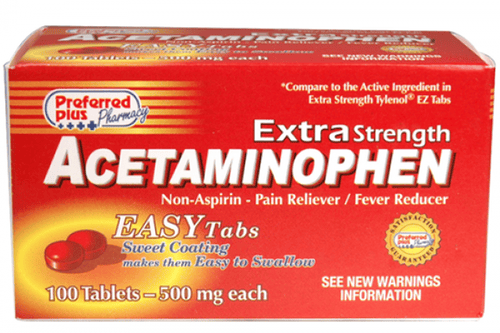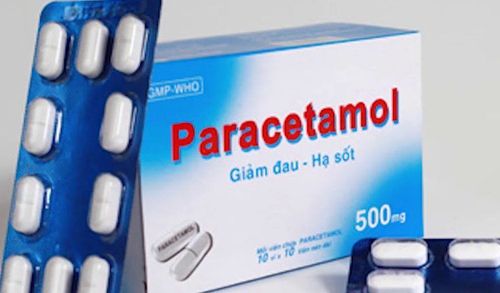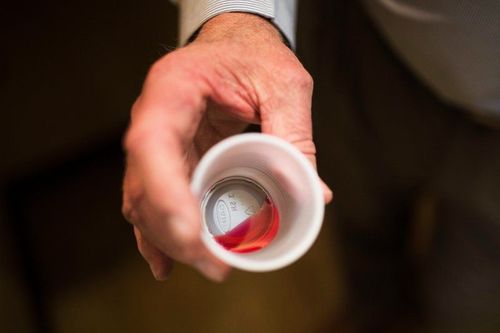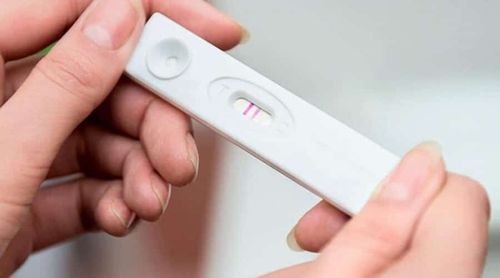This is an automatically translated article.
Posted by Master, Doctor Mai Vien Phuong - Department of Examination & Internal Medicine - Vinmec Central Park International General Hospital
Irritable bowel syndrome (IBS) affects about 10 to 15 percent of adults in the United States, according to estimates by the American College of Gastroenterology. Irritable bowel syndrome is a group of intestinal symptoms that occur together. Symptoms can include: Abdominal cramps, bloating, gas, constipation, etc. Although different triggers affect different people, a variety of factors can trigger them. symptoms, including alcohol.
1. What is irritable bowel syndrome?
Irritable bowel syndrome (IBS) is an uncomfortable digestive disorder that can affect your large intestine, also known as your colon. It can cause a lot of uncomfortable and potentially embarrassing symptoms, from bloating and gas to constipation and diarrhea.
IBS is a collection of symptoms, not a well-defined physical condition. Symptoms vary from person to person. This makes IBS difficult to diagnose. To help make an accurate diagnosis, your doctor may use a variety of tests.
2. Learn how to recognize the most common symptoms of Irritable Bowel Syndrome.
Abdominal pain
One of the most common symptoms of Irritable Bowel Syndrome is abdominal discomfort or pain. You may have stomach cramps after eating. It may be better after you have a bowel movement.
Experts from the National Institute of Diabetes, Digestive and Kidney Diseases say this pain or discomfort can be caused by oversensitive nerves in your intestines. If you have Irritable Bowel Syndrome, your brain may process pain signals from the gut differently than usual.
Bloating
If your stomach feels bloated all the time, it could be a sign of Irritable Bowel Syndrome. Fullness makes your midsection feel tight and full. Your abdomen may also be visibly swollen.
Bloating or bloating
Irritable bowel syndrome often causes abdominal distension, or bloating. Certain foods and drinks can make this symptom worse. For example, you may experience bloating after eating: beans, cabbage, any type of dairy product, foods high in fat, such as tallow, cheese and deep-fried products, beverages contain caffeine, alcohol or artificial sweeteners
Eating foods rich in fiber can also cause bloating. On the other hand, fiber can help relieve some symptoms of Irritable Bowel Syndrome, including constipation. If your doctor recommends that you eat more fiber, gradually increase your fiber intake. This can help reduce the risk of gas and bloating.
Changes to your stool
Irritable bowel syndrome can cause changes to your bowel and stool habits, including constipation and diarrhea. It can also cause the appearance of mucus in your stool. You may have diarrhea or constipation or they may be interchangeable.

Constipation
You may have constipation related to Irritable Bowel Syndrome (Irritable Bowel Syndrome) if you: need to strain to pass stool, have fewer than four bowel movements per week, have bowel movements hard, lumpy and dry stools
Constipation can be very uncomfortable. Chronic constipation can lead to complications, such as hemorrhoids, anal fissures, and stools.
Diarrhea
If you have loose stools several times a day, you may have diarrhea associated with Irritable Bowel Syndrome if. It can also cause a sense of urgency when you need to have a bowel movement.
Mucus in your stool
Mucus in your stool is another potential sign of Irritable Bowel Syndrome. Mucus is a clear liquid that protects and coats the tissues in your digestive tract. With Irritable Bowel Syndrome, you may pass mucus, along with stools.
3. How will your doctor diagnose irritable bowel syndrome?
Your doctor will start by compiling your complete medical history and performing a physical exam. To learn more about your health, they will ask you questions about:
Possible stressors in your life Past or present infections Past or present symptoms at Family history of this condition Medicines that can make your symptoms worse It is important to let your doctor know when your symptoms started and how often you have them. This will help identify patterns between your behavior and discomfort.
a. Diagnostic tests Your doctor may order a variety of diagnostic tests if you are experiencing severe or additional symptoms such as weight loss, anemia, and blood in your stools. While these tests are not required to diagnose IBS, they can rule out other potentially serious conditions.
Blood tests can help rule out celiac disease. This is a wheat allergy that causes symptoms similar to IBS such as cramping and intestinal pain.
b. Stool test A stool sample can check for the presence of blood or parasites, which may indicate an infection.

You are usually asked to follow a liquid diet and enema before the exam. Sedatives can help you relax during surgery. You may experience discomfort and discolored stools for a day or two after the exam.
d. Flexible colonoscopy or colonoscopy These diagnostic procedures allow your doctor to view your rectum and colon with a small camera attached to a thin tube. The tube is inserted gently into your anus. As with colonic tests, this diagnostic procedure usually requires a liquid diet and enema prior to the examination. Taking a sedative may also be an option.
Your doctor may recommend a colonoscopy to rule out colon cancer if you are in a certain risk group based on age, race, or family history.
e. CT scan of the abdomen and pelvis A CT scan of the abdomen and pelvis can help rule out other possible causes of your discomfort, such as problems with the pancreas or gallbladder.
f. Lactose intolerance tests If you can't digest dairy products, you may experience symptoms similar to IBS, such as bloating, gas, and diarrhea. Lactose intolerance can be diagnosed through a breath test or by eliminating dairy products from your diet for several weeks.
Treatment options
Doctors advise, if you experience these symptoms at least three times a month for three months, you may have Irritable Bowel Syndrome. You may experience times when your symptoms get better or worse. If they persist or come back, make an appointment with your doctor. They can help diagnose the underlying cause of your symptoms.
If you have Irritable Bowel Syndrome, your doctor can help you learn how to manage it. You may be advised to change your diet or other habits to help manage your symptoms. In some cases, your doctor may also recommend medications, fiber supplements, probiotic supplements, counseling, or other treatments.
4. Can I drink alcohol if I have irritable bowel syndrome?
There seems to be no definite answer about the specific effects of alcohol on irritable bowel syndrome symptoms. Rather, it's a question that can only be answered in isolation. A 2013 study suggested that the reason for this inconsistency could be that the effects of alcohol on irritable bowel syndrome differ only depending on the condition. The researchers also noted that alcohol reduced the absorption and movement of carbohydrates, such as FODMAPs. This can increase their side effects and therefore irritable bowel syndrome symptoms, such as bloating, gas, and upset stomach. What are FODMAPs? FODMAP is an acronym for fermentable oligosaccharides, disaccharides, monosaccharides and polyols. FODMAPs are carbohydrates that are poorly absorbed by some people. They are associated with digestive symptoms such as:Abdominal pain Bloating Abdominal bloating Constipation Diarrhea

Experts Note that following a low-FODMAP diet can help reduce symptoms for many people with irritable bowel syndrome.
You can even choose alcoholic beverages that may have less of an effect on your irritable bowel syndrome.
Irritable Bowel Syndrome Network notes low FODMAP alcoholic beverages including:
beer (although carbonation and gluten can be a problem for some)
red or white wine (although sugar has may be a problem for some)
High FODMAP alcoholic beverages to avoid include: cider, Rum, yellow wine,...
You can also use the low FODMAP diet to choose a mixer . For example, while many juices are high in FODMAPs, tomato juice and cranberry juice (without high-fructose corn syrup) can be low-FODMAP options. Seltzer is also a low-FODMAP drink for making cocktails.
Tips for drinking when you have irritable bowel syndrome
If you decide to drink, keep an eye on your consumption to help you determine if the type and amount of alcohol is affecting your IBS or not, and if so, how.
Here are some tips to keep in mind:
If you notice an increase in your irritable bowel syndrome symptoms when you drink alcohol, consider abstaining from alcohol.
Make sure to drink water when you drink alcohol. Drinking enough water can help dilute the alcohol, making it less irritating. Eat when you drink. Food in your stomach can help protect it from irritation. Of course, choose your food wisely. Avoid foods that trigger your irritable bowel syndrome symptoms. Maintain slow drinking so that the digestive system has time to process the alcohol. Consider limiting yourself to one drink per day.
Conclusion
If you have persistent abdominal pain, bloating, gas, diarrhea, constipation or mucus in your stool, see your doctor. These symptoms could be signs of Irritable Bowel Syndrome, a condition that can affect your large intestine.
Your doctor can help determine the cause of your symptoms and recommend a treatment plan. If you have Irritable Bowel Syndrome, you can manage your symptoms with a few lifestyle changes. Your doctor may also recommend medications, supplements, or other treatments.
When it comes to drinking, moderation is key. Also, be aware of what's causing your IBS symptoms and find ways to manage those triggers in the future.
For some people, completely avoiding alcohol may be the best solution. And in addition to preventing the triggers of irritable bowel syndrome, not drinking alcohol is often good for your overall health
Currently, Vinmec International General Hospital is a prestigious address trusted by many patients in perform diagnostic techniques for digestive diseases, inflammatory bowel disease, short bowel syndrome, chronic diarrhea, Crohn's disease, ectopic gastric mucosa in the esophagus...
Vinmec Hospital with facilities With modern facilities and equipment and a team of experienced experts, always dedicated to medical examination and treatment, customers can be assured of gastroscopy and esophagoscopy services at International General Hospital. Vinmec.
Please dial HOTLINE for more information or register for an appointment HERE. Download MyVinmec app to make appointments faster and to manage your bookings easily.














